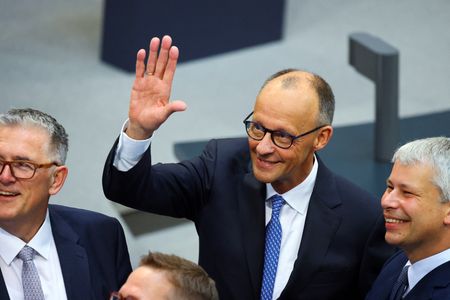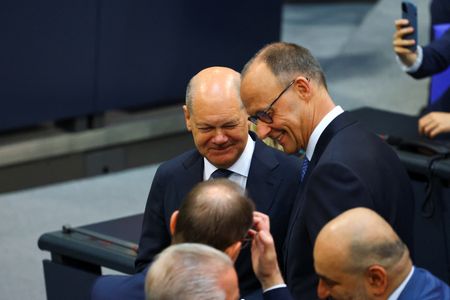By Sarah Marsh
BERLIN (Reuters) – Conservative Friedrich Merz is set to be sworn in on Tuesday as Germany’s new chancellor at a critical juncture as the economy battles its longest post-war downturn, relations with top security ally the United States fray and the far-right surges.
Lawmakers are widely expected to back Merz as chancellor in a vote in the lower house of parliament after his CDU/CSU conservatives, who won February’s federal election, secured a coalition deal with the centre-left Social Democrats.
The pressure is on for Merz to show leadership after the implosion last November of outgoing SPD Chancellor Olaf Scholz’s three-way coalition left a political vacuum at the heart of Europe even as it faced a myriad of crises.
“People have been asking Germany to lead for a long time, and there is no more space to not heed that call,” said Sudha David-Wilp of the German Marshall Fund of the United States.
“Everything that had been undergirding post-war Germany in the past eight decades is no longer the case, whether it be open markets and free trade, whether it be the U.S. security presence in Europe.”
A global trade war sparked by U.S. President Donald Trump’s sweeping import tariffs is threatening a third year of downturn in Europe’s largest economy, which has already had to grapple with the end of cheap Russian gas since Russia’s full-scale invasion of Ukraine in 2022 and growing rivalry from China.
Meanwhile Trump has threatened not to come to the aid of fellow members of the NATO defence alliance, prompting even transatlanticist Merz to question the reliability of the United States and urge Europe to improve its ability to defend itself.
The German coalition deal has mapped out plans to revive growth such as reducing a corporate tax and lowering energy prices. It also vows strong support for Ukraine and higher military spending.
NO GOVERNMENT EXPERIENCE
While Merz is a veteran politician who started his career as a European lawmaker in the 1980s, he still has to prove his chops in power as he has never held a government office.
After losing a power struggle to arch party rival Angela Merkel in 2002, he spent over a decade working in the private sector before finding his way back into top level politics.
A wealthy, Catholic west German lawyer and hobby pilot who served for four years as chairman of the German arm of fund manager BlackRock, Merz is widely considered the antithesis in both style and policy to the woman who led Germany for 16 years.
Where Merkel was an even-tempered pragmatist who shifted the conservatives more towards the centre, Merz is a provocative economic liberal who has pulled the bloc back to the right.
Merz’s supporters highlight the fact he secured a historic fiscal package to boost spending on infrastructure and defence even before taking office.
Critics say it was only necessary because of his erratic decision to push an anti-migration motion through parliament with the backing of the Alternative for Germany, breaking a taboo on cooperation with the far-right.
That decision boosted support for both the AfD and the far-left Left party, who together secured enough support to be able to block a loosening of Germany’s fiscal rules in the next parliament.
“Merz remains a black box,” said Carsten Brzeski, global head of macro at ING. “The U-turn on fiscal policies, as much needed as it was, still begs the question why Merz ruled it out during the elections, and does he really have a longer-term vision on the economy?”
COALITION PLANS
With the AfD topping some recent polls, the new government’s main challenge is clearly to restore confidence and trust in Germany’s political centre, said Brzeski.
“If this government fails, the AfD will get more support in the next elections and could become part of any next government,” he said.
Merz’s designated cabinet reflects a belief in the need for expertise over political capital and a desire for renewal given the declining trust in the establishment, say analysts.
Only one minister from the previous government will retain his position: Defence Minister Boris Pistorius. The rest of the cabinet are new appointees, many of them like the economy minister with private sector experience in the area they will now be governing.
(Reporting by Sarah Marsh; Editing by Alexandra Hudson)














